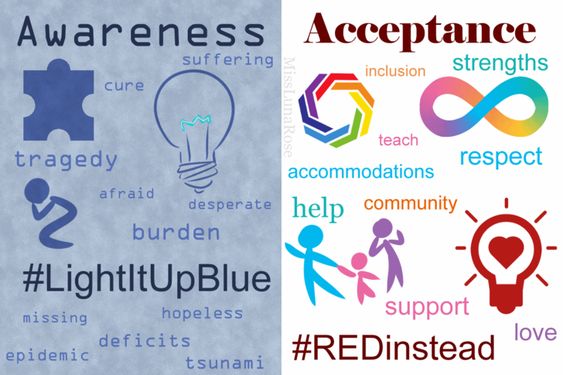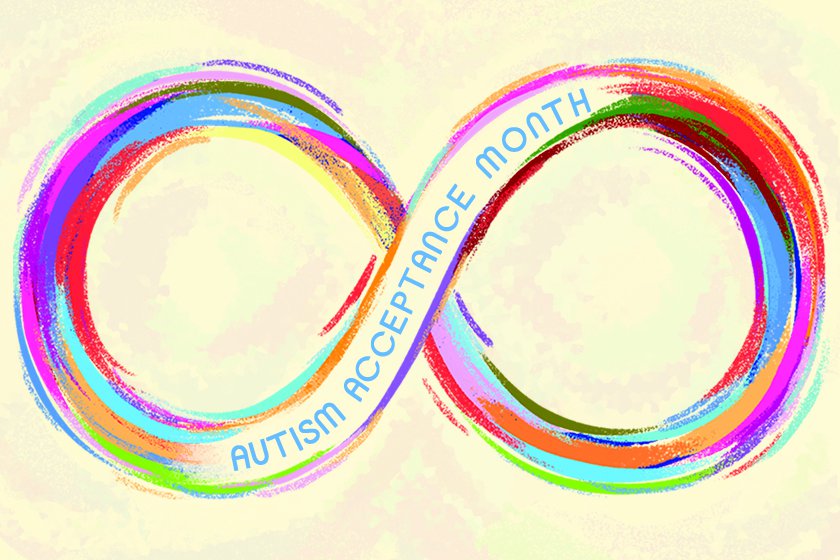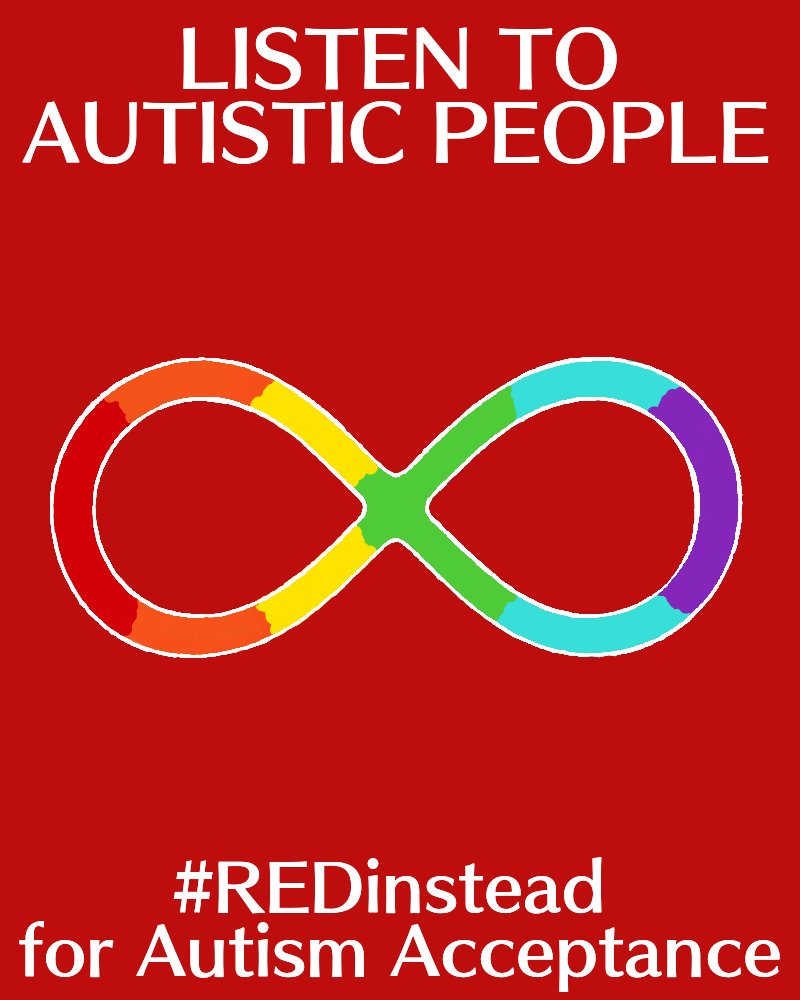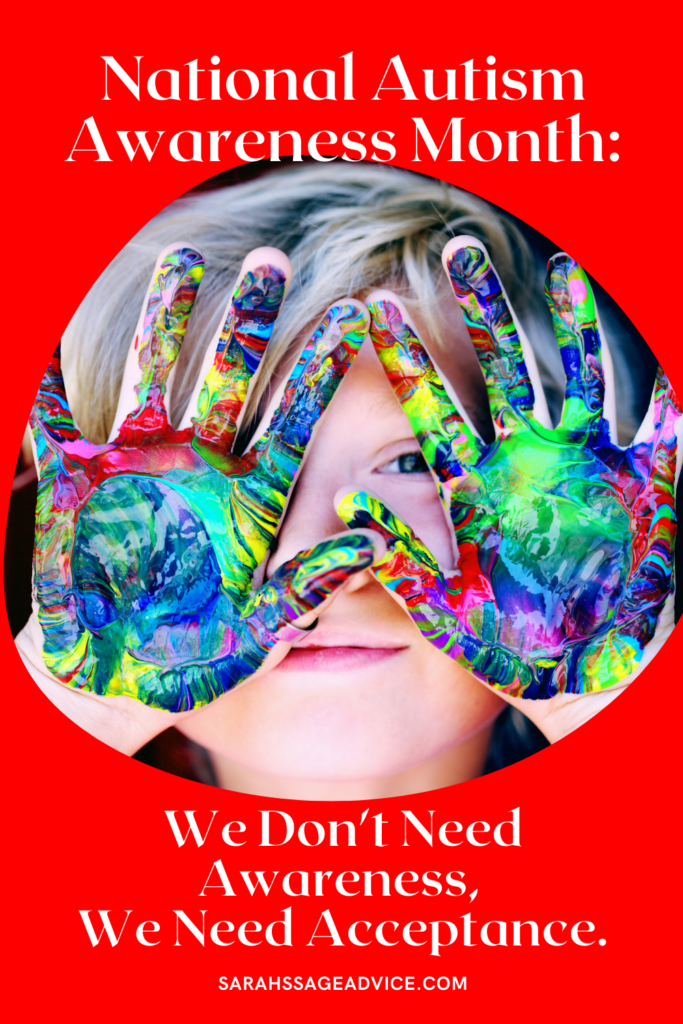National Autism Awareness Month: We Don’t Need Awareness, We Need Acceptance.
Many of you, whether or not you have anyone close to you who is autistic, have heard of Autism Awareness Month in April. Really, however, we do not need to be aware of Autism. So many are aware of Autism.
What is needed is acceptance.
We need to accept that Autism is not new.
Autism, as a diagnosis of children, came about in the 1940s. Also, during the 1940s, Hans Asperger described a “milder” form then known as Asperger’s Syndrome. Before that there is a history in books, journals, letters, of the same traits described in the population it just did not have a set diagnosis. Asperger’s now is not its own diagnosis within the U.S. but rather it is all Autism Spectrum Disorder in the DSM-5 (Diagnostic & Statistical Manual of Mental Disorders).
As Autism was studied throughout the 20th century it was diagnosed more. This accounts for a higher occurrence of diagnoses over the last 80 years. When you understand the traits more it’s easier to identify them and diagnose them in children. Even at a younger age. Today, many adults are being diagnosed because of misunderstanding of traits in the past many children went undiagnosed or were misdiagnosed previously.
The concept of Autism awareness has taken a turn. It utilized a narrative, picturing Autism as always a hard time, poor parents “dealing” with their child’s diagnosis. Many parents utilize autism awareness to take on their child’s diagnosis, parents like the so called “martyr moms” of Autism. We need to move away from awareness, away from focusing on how Autism affects the family, to focusing on the autistic person themselves.
 We need to accept that Autism is not a worldwide epidemic caused by any one thing like Vaccines.
We need to accept that Autism is not a worldwide epidemic caused by any one thing like Vaccines.
There is no link between children receiving a vaccine and “becoming autistic.” I could outline studies specifically looking at vaccines and vaccine ingredients, but the CDC has it outlined well already.
We need to accept that Autism is neurological difference.
Autism in itself is not a mental health disorder but rather a neurological difference. The brain of autistic people works differently than those who are neurotypical. However, it is very common for Autistic children and adults to suffer from co-occurring mental health disorders, such as depression, anxiety, and OCD.
We need to accept that Autism does not need treatment.
Autism in itself does not need a treatment. Autism is a neurological difference that is genetic. No amount of treatment will make an autistic person less autistic. However, specific therapies can help an autistic person with communication and sensory processing issues. These therapies can help an autistic person learn to communicate and understand their emotions, wants, and needs while also help them learn to self-regulate.
We need to accept that having an Autism diagnosis does not necessarily mean an intellectual disability.
Having an intellectual disability is also a co-occurring diagnosis. Many autistic people do have intellectual disabilities but not all. Many autistic individuals can also be harder to test so intellectual abilities can be under- or over-estimated.
We need to accept that all autistic individuals need understanding, patience, and accommodations that fit their needs.
Just like every other neuro-typical, all autistic individuals have different needs, traits, and personalities. There is not one parenting style, discipline, therapy, diet, or medication that will help all autistic individuals. Understanding the needs and traits an individual has will help with understanding that one individual.
We need to accept that functioning labels are not accurate.
Functioning labels such as ‘high-functioning’ and ‘low-functioning’ has been used to describe the needs of autistic individuals for many years. These functioning labels, however, try to describe a person as a whole in a way that cannot be done. The Autism spectrum is not a line where one end is low functioning and the other high. Rather any individual can be high functioning in specific traits and low functioning in others. Also, situations can change their functioning abilities.
We need to accept there is no “look” of autism.
You cannot look at any one individual and know they are or are not autistic. You also cannot take stereotypical traits such as limited eye contact, not social, not talking, and expect that all autistic individuals fit those traits perfectly.
We need to accept that autistic individuals are loving and empathetic.
It is a common myth surrounding autism that autistic individuals do not love, feel emotions, and cannot be empathetic. This is not true. Often times autistic individuals really have very strong emotions. They may need help understanding their emotions to help them control them.
When it comes to empathy, it is important to understand the different types of empathy. Many autistic individuals have trouble with cognitive empathy. This is being able to see another’s perspective, to stand in their shoes and understand their point of view.
 Other things we need to accept about Autism:
Other things we need to accept about Autism:
- They aren’t “symptoms” but rather “traits”- Autism is not a disease.
- The majority of autistic individuals prefer identity first language “autistic person” over person-first language “person with autism”
- Every autistic person is an individual with their own thoughts, feelings, and concerns, if you wonder about their own take and opinion on a subject, ask them.
We need to accept that the puzzle piece, the color blue, Autism Speaks and ABA therapy have a harsh history of leading on fear tactics around Autism, infantilizing autistic people, and promoting cures, eugenics, and other narratives that autistic people are not whole or need to be fixed in some manner.
This April wear #redinstead. The #readinstead movement is to support Autistic individuals rather than Autism Speaks. This article does a great job of laying out why #redinstead. Get rid of blue, puzzle pieces, and supporting Autism Speaks.
Sarah
Everyday of April, I will be writing about Autism, traits, accommodations, and more. As each article is posted they will be tagged here for a directory to help you learn, understand, and become accepting of Autism.


